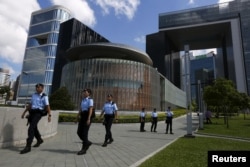A new high-speed rail line that will link mainland China and Hong Kong is drawing criticism over Beijing's plans to place mainland Chinese police officers in the Hong Kong train station.
The planned West Kowloon terminus for the railway linking Kowloon and Guangzhou is not scheduled to open until 2018, but this week Hong Kong officials confirmed that Chinese security officers will be allowed to enforce laws inside the station.
Critics say the admission by Secretary for Justice Rimsky Yuen leads to questions over what laws will be enforced in the station, and whether the move marks a violation of the “one country, two systems” principle that has long guided relations between Beijing and Hong Kong.
The plan immediately met strong opposition with members of the city’s Legislative Council (Legco) vowing to boycott.
“The problem is, if they let Chinese officials execute their law enforcement and, then, it is [will be] a political problem and, also, a constitutional problem as well,” said lawmaker Leung Kwok-hung – a left-wing political activist also known as Long Hair.
After talks with his counterparts in Beijing, Yuen said that “in order to deal with co-location, inevitably mainland officers will be able to enforce laws in the future West Kowloon terminus.” He said that would make the integrated checkpoint “more complicated” than similar checkpoints between France and Britain with the Eurostar rail service.
But Yuen tried to reassure critics, saying the station’s legal codes will be in accordance with the city’s Basic Law and the rule of “one country, two systems.”
He said more discussions will be made between both governments early next year.
Already, many of Leung’s colleagues, including Albert Chan, see the move as a clear violation of both principles.
“If the Chinese authorities are given the legal power to enforce laws [on Hong Kong soil], Hong Kong people’s rights will be abused [in] some way or another. And our whole system is going to be in chaos,” Chan said.
With its independent judiciary and a legal framework based on English Common Law, Hong Kong has a very different legal system from mainland China, with its Basic Law granting freedom of the press, freedom of speech and freedom of assembly.
That has raised questions about which laws Chinese officers will enforce at the Hong Kong station.
Chan asked what would happen if the city’s pro-democracy activists stage an anti-China protest at the terminus, violating laws that exist in China, but do not in Hong Kong?
Critics say the law also could lead to the erosion of liberties in Hong Kong by establishing a precedent for Chinese security officers to operate in the territory.
“Once you [China] have the legal basis, then it’s only a matter of time that the same principle and the same arrangements will be spread across different parts of Hong Kong,” said Albert Lai, vice chairman of the Civic Party, who is also the founding chairman of the Professional Commons, an independent public policy think tank.
Lai accused Hong Kong officials of conspiring with their Chinese counterparts to pressure Hong Kong people into accepting China’s law enforcement on their soil. Prior to this week’s development, the National People’s Congress in Beijing had long maintained the proposal of establishing a mainland checkpoint in Shenzhen City, he added.





